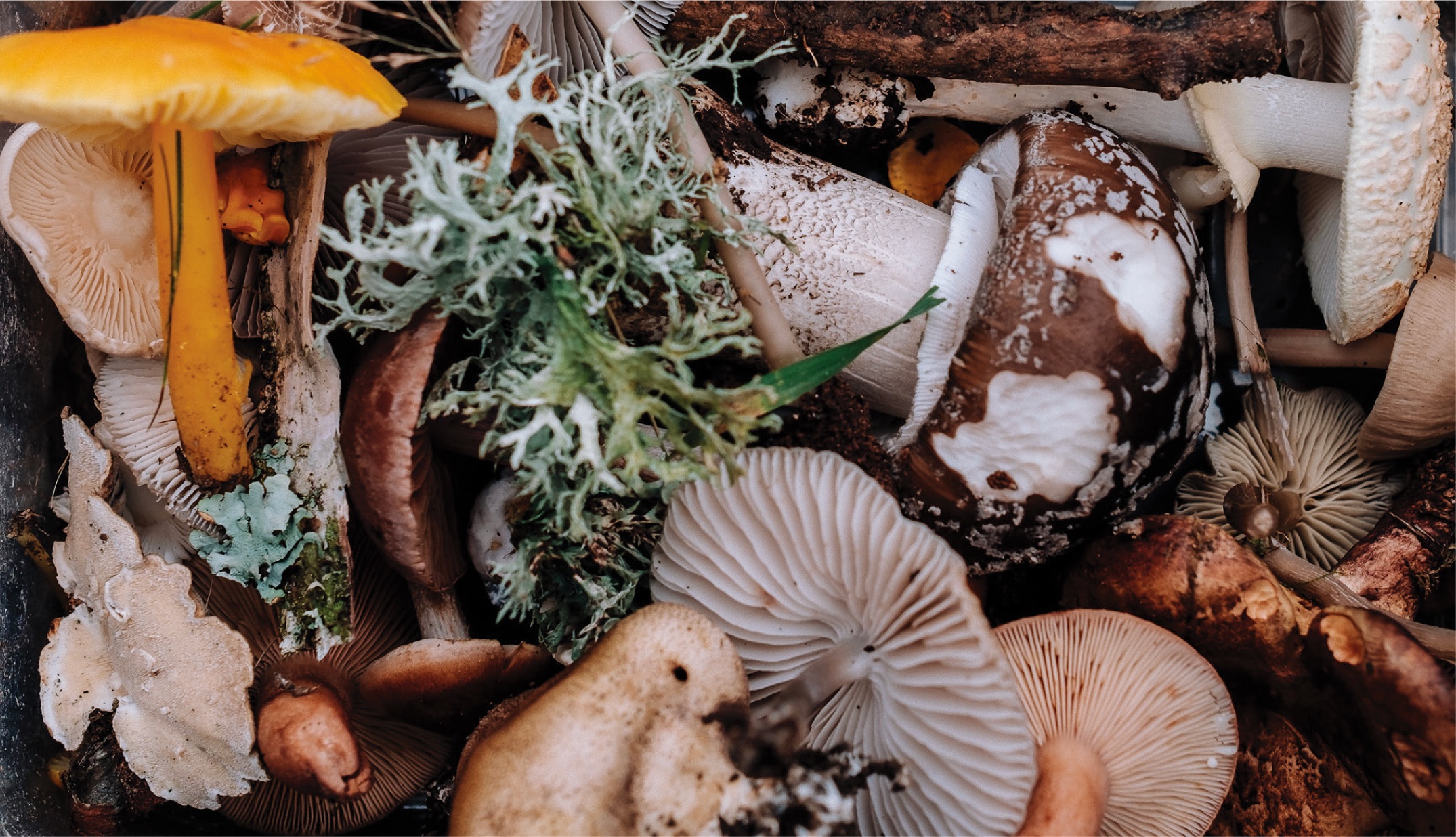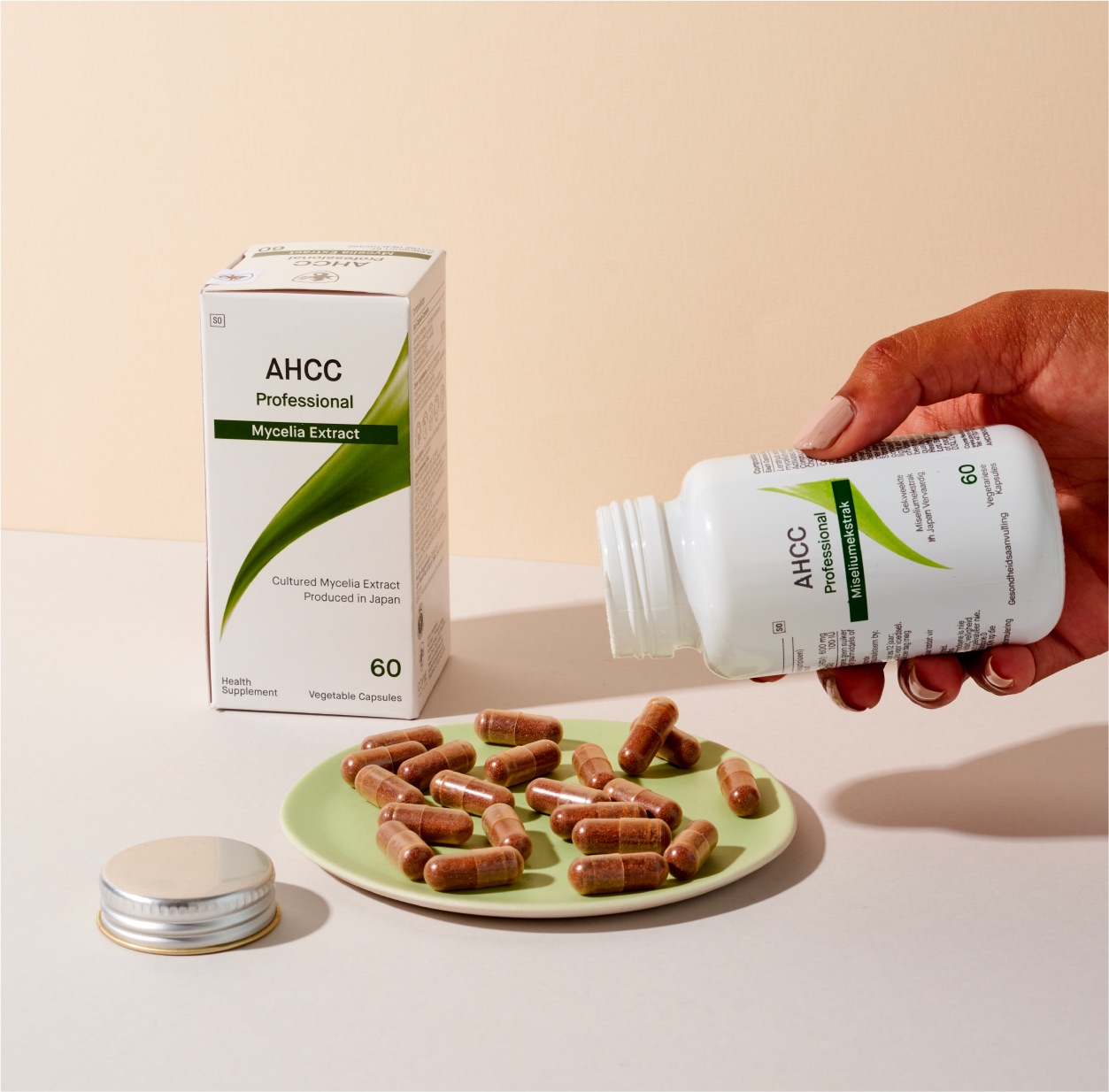from Nature
Supported by over 100 published studies and used for over 20 years, AHCC® is a powerful immunomodulator and has shown benefits for cancer, human papillomavirus infections and liver health.
Supported by over 100 published studies and used for over 20 years, AHCC® is a powerful immunomodulator and has shown benefits for cancer, human papillomavirus infections and liver health.
AHCC® (Active Hexose Correlated Compound) is obtained from Shitake Mushroom which is well known for its immune modulating activity. This patented formulation is a cultured extract of hybridized medicinal mushroom mycelia (roots), of proprietary compound produced by cultivation and enzymatic modification of several species of mushroom mycelia, including shiitake, grown in rice bran extract.
AHCC® is a standardized extract of cultured Lentinula edodes mycelia that was developed by Amino Up Co. Ltd, Japan in 1989 in a collaboration with the University of Tokyo, Japan. This cultured extract contains polysaccharides, amino acids, lipids, and minerals. The main and unique active components are partially acylated alpha-glucans (α-1,4 glucan). The rich supply of α-glucans is the major differentiator between AHCC® and other mushroom-based supplements.

AHCC® is a powerful antioxidant from Shitake Mushrooms which aggressively combats free radicals and boosts the immune system. I recommend and use this product regularly as an effective immuno-protective supplement.

Whilst AHCC® has several benefits, the primary is an immunomodulatory effect, which is now well documented and understood, and validated by scientific and clinical research. AHCC® has been used successfully for over 20 years and is utilized by over 1,000 clinics worldwide and has the unique ability to stimulate the immune system, which is important in controlling inflammation and infection and regulating healthy cell growth.
Through its influence on the immune system, AHCC® may help preserve immunity in those whose defense system is slowly being infiltrated by viruses. Preliminary trials with AHCC® have given encouraging results in certain life threatening viral infections.
Infections are caused by the invasion and the multiplication of microorganisms in the body. We carry 500 to 1000 different species of bacteria throughout our body. Adequate immunity is therefore crucial in preventing infection. Several experiments confirmed AHCC®’s competence for the control of infections.
An excess of toxins can damage the liver. Trials have demonstrated that AHCC® protects the liver and improves hepatic function.
It was reported that patients taking AHCC® to prevent the recurrence of abnormal growths had significant improvements in rheumatoid arthritis. AHCC® was also effective at diminishing inflammation in animal studies. It is thought that AHCC® reduces inflammation by modulating the immune system and by improving fat metabolism.
Some studies have shown that AHCC® promoted healthy blood sugar balance. In addition, AHCC® appears to be an adaptogen and may help relieve stress.
Mushroom and related supplements have a long history of use within medicine and healthcare and are freely available. Whilst AHCC® is derived from shiitake mushrooms, it is a cultured mycelia extract that undergoes a specialised process that results in a unique composition which is replicated in each batch. One of AHCC’s primary differentiators is that it is specifically rich in alpha-glucans whereas most popular mushroom supplements contain beta-glucans. AHCC® contains an alpha- to betaglucan ratio of 30:1 [in favour of alpha (α)].
AHCC contains bioactive molecules that are nontoxic agonists of Toll-like receptors (TLRs), specifically TLR-2 and TLR-4. TLRs are a key family of foreign-substance sensors in the innate and adaptive immune systems that are involved in inflammatory signalling. TLRs are pivotal in stimulating the host immune system’s defence against pathogens. It is understood that the immunomodulatory effect of AHCC is, amongst others, possible through the healthy and appropriate activation of specific TLRs.
AHCC® has been independently researched by over 80 leading institutions around the world. As of 2019, over 100 studies validating the effects of AHCC® have been published. This powerful body of scientific evidence is ever-evolving as research continues with several studies underway and more planned in the future.
Below are summaries of the most significant studies in support of clinical evidence:
Study Objective: To assess whether AHCC can improve the prognosis of patients with hepatocellular carcinoma following surgical treatment over a period of approximately 7 years
Study Design: Prospective, cohort study of 269 patients of which 113 chose to receive AHCC 3 g/day from day of discharge
Outcome: Patients who took AHCC had a significantly longer no recurrence period and an increased overall survival rate
Study Objective: To assess the effect of AHCC on the survival rate of patients with gastric cancer or colon cancer
Study Design: Prospective, cohort study of 245 patients of which Stage I, II or III patients received 3 g AHCC/day and those with Stage IV cancer received 6 g/day (in divided doses)
Outcome: AHCC improved cumulative 5-year survival rates of Stage IA to Stage IIIA gastric cancer and Stage II to III colon cancer compared to other institutions
Study Objective: To assess whether AHCC can attenuate adverse events in patients with unresectable ductal adenocarcinoma of the pancreas and who are receiving chemotherapy with gemcitabine
Study Design: Open-label, non-randomised, prospective, cohort study in which patients could choose to receive AHCC 6 g/day
Outcome: AHCC reduced adverse events associated with chemotherapy and may contribute to quality of life in this group of patients
Study Objective: To evaluate AHCC’s ability to modulate host immune response to clear high-risk (HR) human papillomavirus infections
Study Design: Two pilot studies (10 patients each) in women with confirmed persistent HR-HPV infections received AHCC 3 g from 5 weeks up to 6 months (1st study) or AHCC 1 g for < 8 months (2nd study)
Outcome: AHCC provided durable clearance of HR-HPV infections by supporting the host immune system
Study Objective: To evaluate the safety and effectiveness of AHCC on chemotherapy-induced adverse events and quality-of-life (QOL) in patients with cancer (pancreatic, ovarian, lung, and colorectal)
Study Design: Prospective, cohort study with 24 patients during two cycles of chemotherapy (first without and then with AHCC)
Outcome: AHCC reduced DNA levels of herpes virus type 6 (HHV-6) in saliva and improved QOL, hematotoxicity and hepatotoxicity
Study Objective: To determine whether AHCC will improve immune responses to influenza vaccine in healthy individuals
Study Design: Randomised, controlled trial with 30 healthy adults over 3 weeks
Outcome: AHCC significantly improved protective antibody titres to influenza B vaccine (2009 – 2010 seasonal vaccine)
Study Objective: To investigate the effects of AHCC supplementation and its mechanism of action in patients with alcohol-induced mildly elevated liver enzyme levels
Study Design: Randomised, controlled trial with 62 participants randomly allocated to receive placebo, AHCC 1 g, or AHCC 3 g per day over 12 weeks
Outcome: AHCC improved levels of liver enzymes and anti-inflammatory cytokines in patients with alcohol-induced mild liver enzyme elevations

Matsui Y, Uhara J, et al; Improved prognosis of postoperative hepatocellular carcinoma patients when treated with functional foods: a prospective cohort study; Journal of Hepatology; 2001; 37: 78-86
Kawaguchi Y; Improved survival of patients with gastric cancer or colon cancer when treated with Active Hexose Correlated Compound (AHCC): Effect of AHCC on digestive system cancer; Natural Medicine Journal; 2009 September; 1(1): 1-6
Yanagimoto H, Satoi S, et al; Alleviating effect of Active Hexose Correlated Compound (AHCC) on Chemotherapy-Related Adverse Events in Patients with Unresectable Pancreatic Ductal Adenocarcinoma; Nutrition and Cancer; 2016; 68(2): 234-240
Ito T, Urushima H, et al; Reduction of adverse effects by a mushroom product, active hexose correlated compound (AHCC) in patients with advanced cancer during chemotherapy – the significance of the levels of HHV-6 DNA in saliva as surrogate biomarker during chemotherapy; Nutrition and Cancer; 2014; 1-6
Smith JA, Mathew L, et al; From Bench to Bedside: Evaluation of AHCC Supplementation to Modulate Host Immunity to Clear High-Risk Human Papillomavirus Infections; Frontiers in Oncology; 2019 March; 9: Article 173
Roman BE, Beli E, Duriancik DM, Gardner EM; Short-term Supplementation with Active Hexose Correlated Compound Improves the Antibody Response to Influenza B Vaccine; Nutrition Research; 2013; 33: 12-17
Kim H, Kim J, Im J; Effect of Active Hexose Correlated Compound (AHCC) in Alcohol-Induced Liver Enzyme Elevation; Journal of Nutritional Science and Vitaminology; 2014; 60: 348-356
Takanari J, Hirayama Y, et al; Effects of Active Hexose Correlated Compound on the Seasonal Variations of Immune Competence in Healthy Subjects; Journal of Evidence-based Complementary & Alternative Medicine; 2015; 20(1): 28-34
Ahn GH et al. The Clinical Effectiveness of AHCC® Treatment in Cancer Patients with Progressive or Metastasized Cancers: An Observation of Immune Parameters. AHCC Research Association 8th Symposium, Sapporo, Japan, Aug. 2000
Cotran RS, Kumar V, Collins T. Robbins pathologic basis of disease. 6th ed. Toronto: W.B. Saunders Company. 1999.
Dunn GP, Old LJ, Schreiber RD. The immunobiology of cancer immunosurveillance and immunoediting. Immunity. 2004 Aug;21(2):137-48. Hosokawa M. Combination of AHCC® and Chemotherapy. Anti-Cancer Drugs, 9, 343-350, 1998
Ikeda H, Old LJ, Schreiber RD. The roles of IFN gamma in protection against tumor development and cancer immunoediting. Cytokine Growth Factor Rev. 2002 Apr;13(2):95-109
Imai K, Matsuyama S, Miyake S, Suga K, Nakachi K. Natural cytotoxic activity of peripheral-blood lymphocytes and cancer incidence: an 11-year follow-up study of a general population. Lancet. 2000 Nov 25;356(9244):1795-9.
Ishibashi H, et al. Prophylactic Efficacy of a Basidiomycetes Preparation AHCC® against Lethal Opportunistic Infections in Mice. Yakugaku Zasshi, 120(8),715-719. 2000
Ishiguro A. Anti-Carcinogenic Activity of AHCC® and PMP. The 2nd Annual Meeting of the Japanese Society for Alternative Medicine & Treatment. Oct. 1999.
Katsuaki Uno, Kenichi Kosuna, Bxiang Sun, Hajimi Fujii, Koji Wakame, Shizuko Chikumaru, George Hosokawa, Yuji Ueda. Active Hexose Correlated Compound (AHCC®) Improves Immunological Parameters and Performance Status of Patients with Solid Tumors. Biotherapy 2000; 14(3):303-309
Matsui Y, Uhara J, Satoi S, Kaibori M, Yamada H, Kitade H, Imamura A, Takai S, Kawaguchi Y, Kwon A-H and Kamiyama Y. Improved prognosis of postoperative hepatocellular carcinoma patients when treated with functional foods: a prospective cohort study. Journal of Hepatology 2002;37(1):78-86. Matsushita K. et al., Combination therapy of active hexose correlated compound (AHCC®) plus UFT significantly reduces the metastasis of rat mammary carcinoma, Anti-Cancer Drugs, 343-350, Sep 1998.
Prasad KN. Multiple dietary antioxidants enhance the efficacy of standard and experimental cancer therapies and decrease their toxicity. Integr Cancer Ther. 2004 Dec;3(4):310-22.
Reuters. Report: More than half of U.S. cancer deaths could be prevented-Lifestyle changes would eliminate majority of cases. Washington. March 31, 2005
Rosenberg ES, et al. Immune control of HIV-1 after early treatment of acute infection. Nature 407, 523 – 526 (28 September 2000)
Sun B, Wakame K, Mukoda T, Toyoshima A, Kanazawa and Kosuna K. Preventive Effect of AHCC® on Carbon Tetrachloride Induced Liver Injury in Mice. Natural Medicine 51(4), 310-315. 1997
Uno K, Chikumaru S, Hosokawa T. Cancer immunotherapy by a phyto-polysaccharide (AHCC®): its effects and strategy. AHCC Research Association 8th Symposium, Sapporo, Japan, Aug. 2000
Wakame K. Protective Effects of Active Hexose Correlated Compound (AHCC®) on the Onset of Diabetes Induced by Streptozotocin in the Rat. Biomedical Research 20 (3) 145-152. 1999
Wang S et al. Preventive Effects of Active Hexose Correlated Compound (AHCC®) on Oxidative Stress Induced by Ferric Nitrilotriacetate in the Rat. Dokkyo Journal of Medical Sciences 28(2-3). 745-752. 2001
Immunological effect of active hexose correlated compound (AHCC®) in healthy volunteers: a double-blind, placebo-controlled trial.
Nutr Cancer. 2008; 60(5):643-51.
Terakawa N, Matsui Y, Satoi S, Yanagimoto H, Takahashi K, Yamamoto T, Yamao J, Takai S, Kwon AH, Kamiyama Y.
The aim of this study was to evaluate the effects of active hexose correlated compound (AHCC®) intake on immune responses by investigating the number and function of circulating dendritic cells (DCs) in healthy volunteers. Twenty-one healthy volunteers were randomized to receive placebo orAHCC at 3.0 g/day for 4 wk. The number of circulating cluster of differentiation (CD)11c( ) DCs (DC1) and CD11c(-) DCs (DC2) were measured. Allogeneic mixed-leukocyte reaction (MLR) was performed. Natural killer (NK) cell activity and the proliferative response of T lymphocytes toward mitogen (phytohemagglutinin [PHA]) were measured. We also measured cytokine production stimulated by lipopolysaccharide [interleukin (IL)-2, IL-4, IL-6, IL-10, interferon gamma-gamma, tumor necrosis factor-alpha). The AHCC® group (n = 10) after AHCC® intake had a significantly higher number of total DCs compared to that at baseline and values from control subjects (n = 11). The number of DC1s in the AHCC® group after intake was significantly higher than at baseline. DC2s in the AHCC® group were significantly increased in comparison with controls. The MLR in the AHCC® group was significantly increased compared to controls. No significant differences in PHA, NK cell activity, and cytokine production were found between groups. AHCC® intake resulted in the increased number of DCs and function of DC1s, which have a role in specific immunity.
A Phase I study of the safety of the nutritional supplement, active hexose correlated compound, AHCC®, in healthy volunteers.
J Nutr Sci Vitaminol (Tokyo). 2007 Dec;53(6):536-9.
Spierings EL, Fujii H, Sun B, Walshe T.
Active Hexose Correlated Compound (AHCC®) is an extract of Lentinula edodes of the basidiomycete family of fungi rich in alpha glucans. AHCC® has been used for many years as a dietary supplement to enhance the immune system and in clinical trials as an adjunctive treatment in Hepatocellular cancer. This multiple dose, Phase I trial, using FDA guidelines, directly investigates the clinical safety and tolerability of AHCC® in healthy subjects. Its safety has been based previously on anecdotal reports and its use in clinical practice. Twenty-six healthy male or female subjects between the ages of 18 and 61 were recruited from the community and gave their consent to participate in the trial. The subjects were given 9 g of AHCC® (150 mL of the currently available liquid AHCC®) PO daily for 14 d. Laboratory data was obtained at baseline and after 14 d of exposure to AHCC® and adverse events were monitored by a non-directed review of systems questionnaire three times during the trial. At each visit the vital signs and adverse events were recorded. Two subjects (7%) dropped out because of nausea and intolerance of the liquid. Adverse effects of nausea, diarrhea, bloating, headache, fatigue, and foot cramps occurred in a total of 6 subjects (20%) but were mild and transient. There were no laboratory abnormalities. When used in high dose in healthy subjects, AHCC® causes no significant abnormality in laboratory parameters. The adverse effects of 9 g of liquid AHCC® per day, a higher dose than used in routine clinical applications, are minimal and the dose was tolerated by 85% of the subjects.